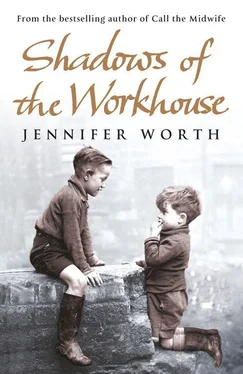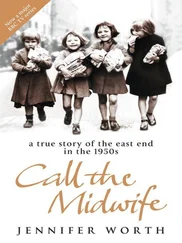Jennifer Worth - Shadows Of The Workhouse - The Drama Of Life In Postwar London
Здесь есть возможность читать онлайн «Jennifer Worth - Shadows Of The Workhouse - The Drama Of Life In Postwar London» весь текст электронной книги совершенно бесплатно (целиком полную версию без сокращений). В некоторых случаях можно слушать аудио, скачать через торрент в формате fb2 и присутствует краткое содержание. Жанр: Биографии и Мемуары, на английском языке. Описание произведения, (предисловие) а так же отзывы посетителей доступны на портале библиотеки ЛибКат.
- Название:Shadows Of The Workhouse: The Drama Of Life In Postwar London
- Автор:
- Жанр:
- Год:неизвестен
- ISBN:нет данных
- Рейтинг книги:5 / 5. Голосов: 1
-
Избранное:Добавить в избранное
- Отзывы:
-
Ваша оценка:
- 100
- 1
- 2
- 3
- 4
- 5
Shadows Of The Workhouse: The Drama Of Life In Postwar London: краткое содержание, описание и аннотация
Предлагаем к чтению аннотацию, описание, краткое содержание или предисловие (зависит от того, что написал сам автор книги «Shadows Of The Workhouse: The Drama Of Life In Postwar London»). Если вы не нашли необходимую информацию о книге — напишите в комментариях, мы постараемся отыскать её.
Shadows Of The Workhouse: The Drama Of Life In Postwar London — читать онлайн бесплатно полную книгу (весь текст) целиком
Ниже представлен текст книги, разбитый по страницам. Система сохранения места последней прочитанной страницы, позволяет с удобством читать онлайн бесплатно книгу «Shadows Of The Workhouse: The Drama Of Life In Postwar London», без необходимости каждый раз заново искать на чём Вы остановились. Поставьте закладку, и сможете в любой момент перейти на страницу, на которой закончили чтение.
Интервал:
Закладка:
“It was humiliating to us, and to our commanding officers. We were sent out to fight men, not defenceless women and children. We should never have done it. Never.” Mr Collett clenched his hands tightly.
“It was a black time for the British Empire. Thirty thousand women and children died, mostly young children, and we were disgraced in the eyes of the world. We outnumbered the Boer fighting men by twenty-five to one, yet even then we couldn’t win without attacking their homes, their womenfolk and their children.
“In the spring of 1903 I sailed for home, and I was discharged from the army in 1906.”
“Did you regret your army years, or do you look back on them with pleasure?” I asked.
“Mixed feelings. The army certainly educated me and broadened my mind. I mixed with men from other backgrounds and experienced other ideas and points of view. Without the army, I would have been a casual dock labourer, mostly unemployed, so I am grateful for the work. With my army record, I was able to get a good job as a postman. And a postman I remained for the rest of my life until I retired with a pension to keep me comfortably in my old age.”
His ingenuous simplicity had always charmed me. He looked upon his squalid, bug-ridden flat as comfort, even luxury; he was grateful for a modest pension that enabled him to buy food and coal sufficient for his needs. He saw himself as a wealthy man, who could afford to buy a bottle of sherry and a box of chocolates with which to entertain a young nurse of whom he had grown fond. He was completely content.
I leaned forward and squeezed his hand with affection. “I think it’s getting late and I must go, but next time you must tell me about re-adjusting to civvy life. I guess your twins didn’t know you?”
He didn’t reply, but looked dreamily into the fire. “You go, my maiden, you go,” he said, softly. I left an old man to his memories, the consolation of loneliness.
My next visit to Mr Collett was a morning about three days later. His legs had improved beyond all recognition and the ulcers were now completely dry. It was very gratifying.
On the mantelpiece, amid all the dingy and faded old photographs, was a gleaming white card, with a gold border and an embossed crown on it, requesting the pleasure of the company of Mr Joseph Collett and lady at the Old Guards’ reunion at Caterham Barracks on a Saturday in June. I remarked on the card. He told me that for several years he had enjoyed going to the Old Guards’ Day, but had not been able to go in recent years, due to his deteriorating eyesight and bad legs.
Impulsively I said, “Look, your legs are so much better now. It won’t be any trouble for you to get around. Let’s go together. It looks like good fun. It’s not every girl has an opportunity like this, and I don’t want to miss it.”
He positively lit up. He took my hands and kissed them. “You darling girl! What a wonderful idea. It hadn’t even crossed my mind. We’ll go, and we’ll make a day of it. I can tell you, the Guards do us old soldiers proud. What a day we’ll have! What a day!”
I requested the day off well in advance, telling Sister Julienne about the invitation, and the plans. The girls were most intrigued; what on earth would it be like? Trixie suggested that a Young Guards’ reunion might be more exciting, but wished me pleasure with my old ones.
The day itself dawned bright and fair. I was round at Alberta Buildings shortly after eight o’clock. Mr Collett was excited and chatty. He was dressed for the occasion in a faded old suit. His shoes had been polished, and he carried a new trilby hat. Most important of all, and by far the most impressive, he was wearing a row of medals on his chest. It had not occurred to me that he had medals, and I looked at them closely. He was proud and happy, telling me what each of them was for.
We took the bus from Blackwall to Victoria Coach Station, and then a coach to Caterham, arriving at about ten o’clock. I was excited, having never been inside a barracks before. For a young, inexperienced girl it was a stupendous occasion, and my excitement communicated itself to Mr Collett. We stayed very close together, because of the crowds, and I held his arm all the time as he couldn’t see clearly. I had expected a rather solemn occasion with a lot of old men talking about old times. But it was nothing like that. It was an Open Day, with full military honours and pageantry. The reunion itself was an evening event.
The day was exhilarating. The British Army really knows how to put on a show. The colour, the flags, the pipes and drums, the drills. The scarlet uniforms, black busbies, the marching, with the pipe major throwing his staff high into the air. I was thrilled. Mr Collett had seen it all before, and couldn’t see it very well this time, but he heard my cheers and was delighted.
Towards evening, when the marching and the drilling had ceased, and the tired crowds were starting to leave, I thought we would be leaving also. But Mr Collett pulled me back. “Now it is time for the regimental dinner. Come on, my beauty. This way. They’ll see ‘the privates know how to pick ’em’.”
We went to the great dining room by special invitation. We were a little late, because Mr Collett’s walking was slow. We passed young soldiers, who clicked their heels and saluted. We entered, the doorman took our card, and called: “Mr Joseph Collett and Miss Jenny Lee.” There were about two hundred men and women seated at the tables. Heads looked up, and then a voice called out: “Gentlemen, now here is a really old guardsman.” And everyone in the room stood up and raised their glasses: “To an esteemed old soldier.”
Tears of emotion sprang from Mr Collett’s eyes. We were led to the Colonel’s table, and placed at his side. The dinner was sumptuous, and the Colonel and his lady so gracious to the old man. They talked about the Boer War, and Africa, and army life sixty years earlier. He was treated with the respect and recognition that he deserved so well.
FRANCE
1914-1918
The joyous day at Caterham Barracks cemented our friendship and I knew then that, come what may, I was bound to Mr Collett for life. We chatted and laughed all the way home, and parted at the bus stop near Blackwall Tunnel. He insisted that he didn’t need me to go back with him, as he was perfectly capable of finding his way in the dark. It gladdened my heart to remember the respect, even deference, with which he had been treated at the barracks by the Colonel. He would not forget that day in a hurry.
One day, whilst treating his legs, I asked him about his life after leaving the army. I knew that Sally and the twins were living in Alberta Buildings by that stage. Did they continue to live there when he came back?
“No. I got a job in the Post Office you see, and so we had to move near to the sorting office in Mile End.” He went on to tell me about his new life. Postmen had to sort their own mail in those days, and had to be in the sorting house by four o’clock each morning to receive the night mail. Sorting took a couple of hours, then they would be out on the road delivering until about 1 p.m. After a couple of hours off, they went back to sort and deliver the evening mail, which finished about 7 p.m. Mr Collett thought it was a good life.
“The twins were getting bigger. Pete and Jack were about six or seven, and the spitting image of each other. No one except their mother could tell them apart and even she got it wrong sometimes. They were lovely boys.”
He bit his lip and swallowed hard, choking down the emotion.
“You’ve heard, I suppose, that identical twins often seem to live for each other. Well, I can tell you how true that is. They were two people, but I often thought that neither of them could be quite sure where one ended and the other began. They were always together, you couldn’t separate them. They didn’t seem to need anyone else. They even spoke their own language. Yes, it’s true! We would listen to them playing, Sally and me, and they used different words with each other than they used with everyone else. It was a mixture of ordinary English and their own language. They could understand it, but we couldn’t. You can never be quite sure what’s going on in a child’s mind, and identical twins are more of a mystery than other children. Pete and Jack lived in a world created by their combined imaginations, filled with giants and dwarves, kings and queens, castles and caverns. They didn’t really have any friends. They didn’t need them. They had each other.”
Читать дальшеИнтервал:
Закладка:
Похожие книги на «Shadows Of The Workhouse: The Drama Of Life In Postwar London»
Представляем Вашему вниманию похожие книги на «Shadows Of The Workhouse: The Drama Of Life In Postwar London» списком для выбора. Мы отобрали схожую по названию и смыслу литературу в надежде предоставить читателям больше вариантов отыскать новые, интересные, ещё непрочитанные произведения.
Обсуждение, отзывы о книге «Shadows Of The Workhouse: The Drama Of Life In Postwar London» и просто собственные мнения читателей. Оставьте ваши комментарии, напишите, что Вы думаете о произведении, его смысле или главных героях. Укажите что конкретно понравилось, а что нет, и почему Вы так считаете.






![Theresa Cheung - The Dream Dictionary from A to Z [Revised edition] - The Ultimate A–Z to Interpret the Secrets of Your Dreams](/books/692092/theresa-cheung-the-dream-dictionary-from-a-to-z-r-thumb.webp)





